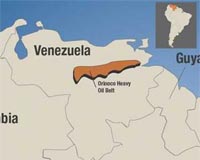 |
Tehran (AFP) April 24, 2010 Iran's powerful Revolutionary Guards boasted on Saturday that they can fill the gap in the country's energy sector left by Western oil firms pulling out in the face of new sanctions against Tehran. A top commander highlighted the unit's growing influence in the economy even as Guards ground, air and naval forces flexed their muscles in a drill in the key Strait of Hormuz oil route that began on Thursday. Brigadier General Yadollah Javani, who heads the Guards' political bureau, also played down the impact of Western sanctions on its trading arms and personnel. "Today, the Revolutionary Guards are proud to declare that they have the ability and know-how to easily replace large foreign companies," Javani told the ILNA news agency. "For example, we can take up big projects in (the southern port and energy hub of) Assalouyeh and replace Total and Shell," he said, referring to oil majors that had previously been involved in Iran. The Guards' presence in the economy has risen under the presidency of hardliner Mahmoud Ahmadinejad, even as the United States and European Union target the body for "weapons proliferation" amid accusations it is involved in Tehran's controversial nuclear programme. The Guards were formed by Iran's revolutionary leader Ayatollah Ruhollah Khomeini soon after the 1979 revolution to defend the Islamic republic from internal and external threats. They are one of Iran's most powerful institutions and fall under the direct command of Ayatollah Ali Khamenei, who succeeded Khomeini as the nation's supreme leader. In recent months Washington has been pushing for a fourth round of UN sanctions against Tehran that, among other measures, European diplomats say would specifically target the Guards' business interests. It is the growing economic power of the Guards that Washington has been targeting for several years with its own unilateral sanctions. The Guards now permeate all of Iranian society, with their engineering arm picking up massive contracts. Iranian media have reported that the Guards' main industrial arm, Khatam-ol Anbiya Construction, which has some 25,000 engineers and staff, has been bidding for energy projects as multinational firms come under pressure to reduce their involvement in the face of UN and US sanctions. In 2006, the Guards won a contract worth more than two billion dollars to develop phases 15 and 16 of Iran's biggest gas field, South Pars, and another contract of around one billion dollars to build a pipeline towards Pakistan. They are also part of a consortium contracted to build a high-speed rail link between Tehran and the central city of Isfahan, shipping ports on the south coast and a major dam in Khuzestan province. On Saturday, Oil Minister Masoud Mirkazemi raised possibilities of new contracts for the Guards, saying that if foreign companies fail to participate on time, "we will not wait for them and ink deals with domestic companies." Javani dismissed the sanctions threat, saying Western governments would not achieve their objectives. "Talk of imposing sanctions on the Revolutionary Guards is a bit funny," he said. "They could not achieve their goals by imposing sanctions on the Islamic republic. Surely, with the Guards too, they will fail to reach their objectives." The general said the Guards are now "inseparable from the regime and from the people." "The strength of the Guards comes from its reliance on the people. If they think they can impose sanctions on the Guards, they are wrong." Militarily, the Guards' hundreds of thousands of personnel work in parallel with Iran's regular armed forces and have their own land, sea, air and missile units. They have repeatedly warned they have US bases in Iraq and Afghanistan under watch, implying the force will pound them and could shut down the sea lanes to the oil-rich Gulf if the United States launches a military attack. On Saturday, the Guards declared that by March 2011 they would be deploying a new "stealth super advanced drone bomber". Iranian drones have raised concerns in the US military.
Share This Article With Planet Earth
Related Links Powering The World in the 21st Century at Energy-Daily.com
 Venezuela holds keys to Orinoco oil wealth
Venezuela holds keys to Orinoco oil wealthCaracas (AFP) April 22, 2010 Companies from around the world have flocked to Venezuela's Orinoco Belt over the past three years to work on extracting heavy and ultra-heavy oil - an expensive process made worthwhile with oil prices rising. These companies want some of the action even after leftist President Hugo Chavez changed investment rules in 2007 and mandated that the state oil consortium, Petroleos de Venezuela (P ... read more |
|
| The content herein, unless otherwise known to be public domain, are Copyright 1995-2010 - SpaceDaily. AFP and UPI Wire Stories are copyright Agence France-Presse and United Press International. ESA Portal Reports are copyright European Space Agency. All NASA sourced material is public domain. Additional copyrights may apply in whole or part to other bona fide parties. Advertising does not imply endorsement,agreement or approval of any opinions, statements or information provided by SpaceDaily on any Web page published or hosted by SpaceDaily. Privacy Statement |